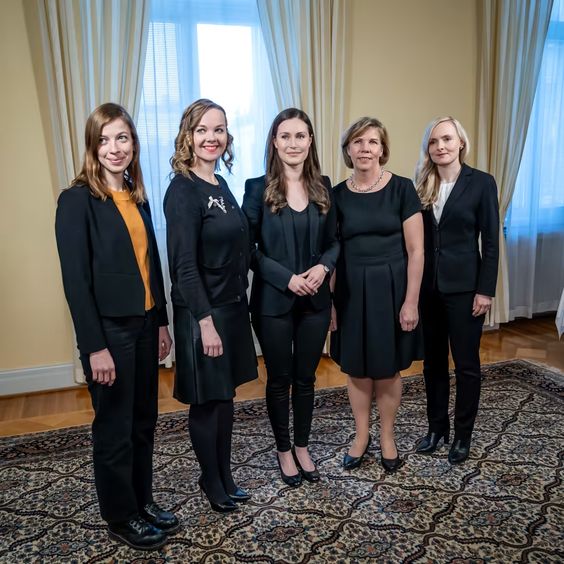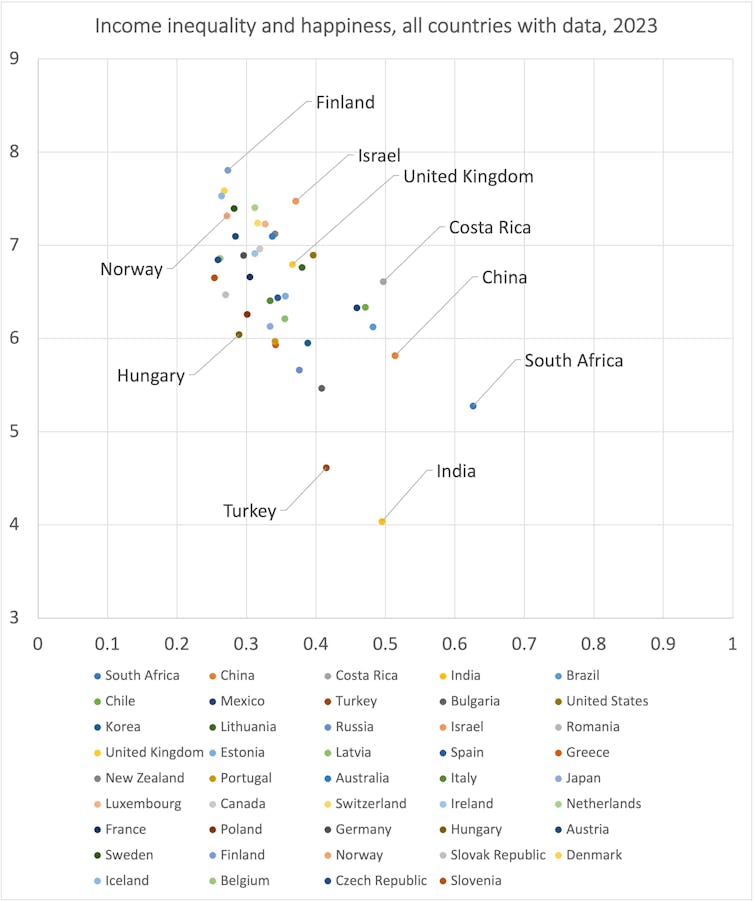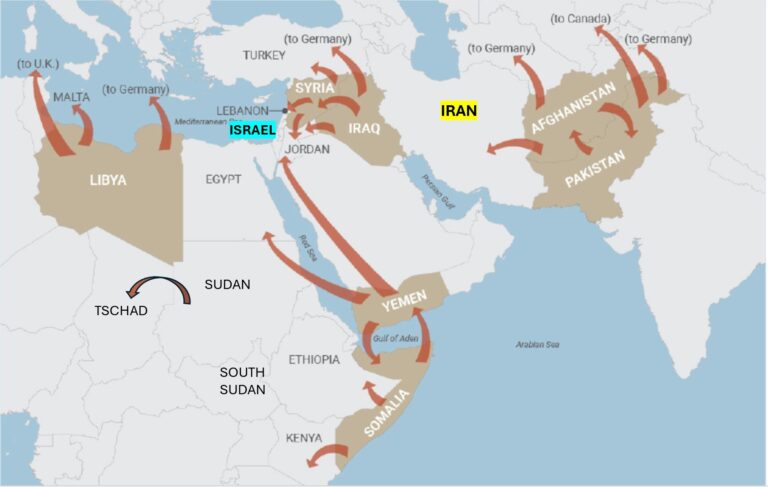
Finland’s election: what happened to Sanna Marin and what to expect next
Danny Dorling, University of Oxford
Finland has been the happiest country on earth for the past six years, according to the World Happiness Survey. This survey relies on the Cantril ladder life evaluation question:
Please imagine a ladder with steps numbered from zero at the bottom to 10 at the top. The top of the ladder represents the best possible life for you and the bottom of the ladder represents the worst possible life for you. On which step of the ladder would you say you personally feel you stand at this time?
Finland comes out top, followed by Denmark and Iceland. Just why Finns are happier than others comes down to a number of factors including lower income inequality (most importantly, the difference between the highest paid and the lowest paid), high social support, freedom to make decisions, and low levels of corruption.
The graph below shows all 44 counties for which there is both happiness data and income inequality data, each as a colored dot. The vertical scale shows average happiness, the horizontal scale income inequality.
Average levels of happiness and inequality by country

World Happiness Survey and OECD income inequality statistics
The measure of income inequality used here is the Gini coefficient of income inequality, as reported by the OECD. It is the highest rate recorded in each county in any year after 2010 up to the most recent year for which there is data. The graph shows the close relationship between these two measures. In general, when income inequality is larger, money matters more and people are less happy.
Finland also has other attributes that may help people feel happier. It has a highly decentralized, publicly funded healthcare system and only a very small private health sector. This is far more effective and efficient than some alternatives used in other countries. Public transport is reliable and affordable, and Helsinki Airport is ranked the best in northern Europe.
There is a Finnish proverb that seems relevant here: Onnellisuus on se paikka puuttuvaisuuden ja yltäkylläisyyden välillä (Happiness is a place between too little and too much).
How Finland compares
Finland, Norway, and Hungary report similar levels of income inequality, yet people in Finland are, on average, happier. Why is this?
According to the World Inequality Database, the highest-paid tenth of people in Finland take home a third of all income (33%). That contrasts with the same group taking 36% in the UK and 46% in the US. These differences may not appear great, but they have a huge effect on overall happiness because so much less is left for the rest in the more unequal countries – and the rich become more fearful. When a small number of people become much richer, this is an understandable fear.
In 2021, it was suggested by a sociology professor that simply by having more reasonable expectations, people in Nordic countries appeared to be happier. However, that cannot explain why Finland differs from Norway on the happiness scale.
All kinds of explanations are possible, including slight nuances of language and culture. There is now even the question of whether this global survey is beginning to introduce its own bias, as Finns now know why they are being asked the question (they moved even further ahead of Denmark in the most recent survey).
However, Finland likely has more equitable schools, where you are likely to get a good education whichever you choose, and a fairer school policy than Norway (almost all Finns go to their nearest school) might matter too. So too, a better housing policy with a wide variety of social housing and lower homelessness, a health service with waiting times that are the envy of the world – sometimes just being a matter of days (even during the worst years of the pandemic) – and numerous other accolades.
Finland ranks first, second, or third in over 100 global measures of economic and social success – better than Norway. And it has less money overall (and hardly any oil). You could excuse the Finns a little smugness (omahyväisyys).
Why does Hungary do so badly despite the income gap between its people being hardly any wider than in Finland and Norway? One could argue that this is to do with its divided politics. In 2022, the European Parliament suggested that “Hungary can no longer be considered a full democracy.”
Freedom matters to people greatly, as well as freedom from fear. That could also explain why Turkey and India have lower levels of happiness than their levels of economic inequality might predict.
In contrast, South Africa and China may be a little happier than their levels of inequality would suggest. South Africa became a democracy in 1994, shortly after Nelson Mandela was freed, and many people will remember the previous period. People in China are not as fearful as they are often portrayed in the West.
Inequality is a factor
Most countries exhibit happiness levels (and much else) that are very predictable from their inequality levels. The UK is spot on in the middle of what you would expect for one of Europe’s most economically unequal countries.
The graph above also shows that (almost as unequal) Israel is a little happier than it ought to be – although it is not clear that the sample taken there included all groups that currently live under that state. Also, that sample was taken in 2022, before the recent widespread protests in Israel.
The other outlier shown in the graph is Costa Rica, where the president said in 2019:
Seventy years ago, Costa Rica did away with the army. This allows for many things. Eight per cent of our GDP is invested in education because we don’t have to spend on the army. So our strength is human talent, human wellbeing.
So what can the people of a country do if they want to be happier? The most important thing is to elect governments to ensure the country becomes more equal by income. After that, ensuring your social services – school, housing, and healthcare – are efficient and equitable matters most. And finally, consider your degree of freedom, whether you are actually including everyone in your surveys, and how fearful your population is.![]()
Danny Dorling, Halford Mackinder Professor of Geography, University of Oxford
This article is republished from The Conversation under a Creative Commons license. Read the original article.




1 Comment
Pingback: spa music